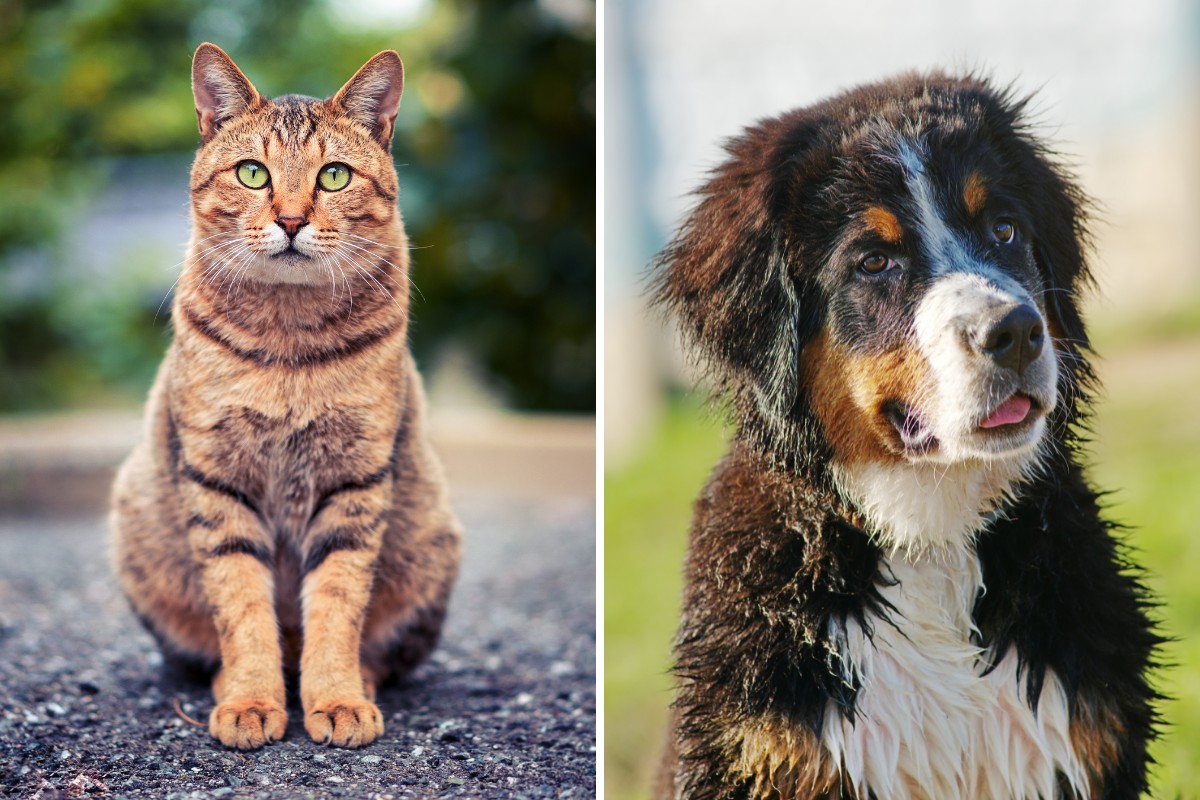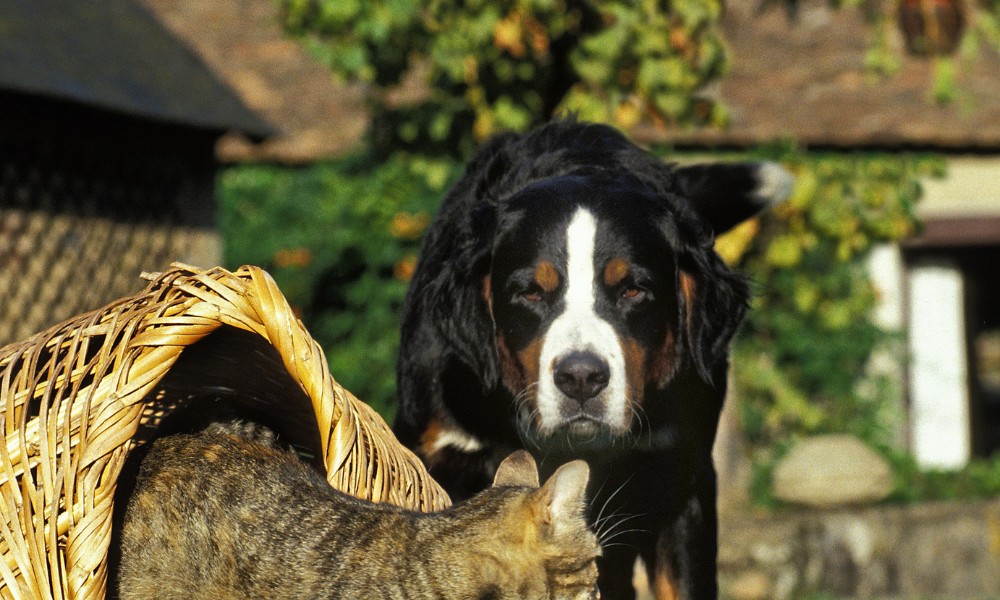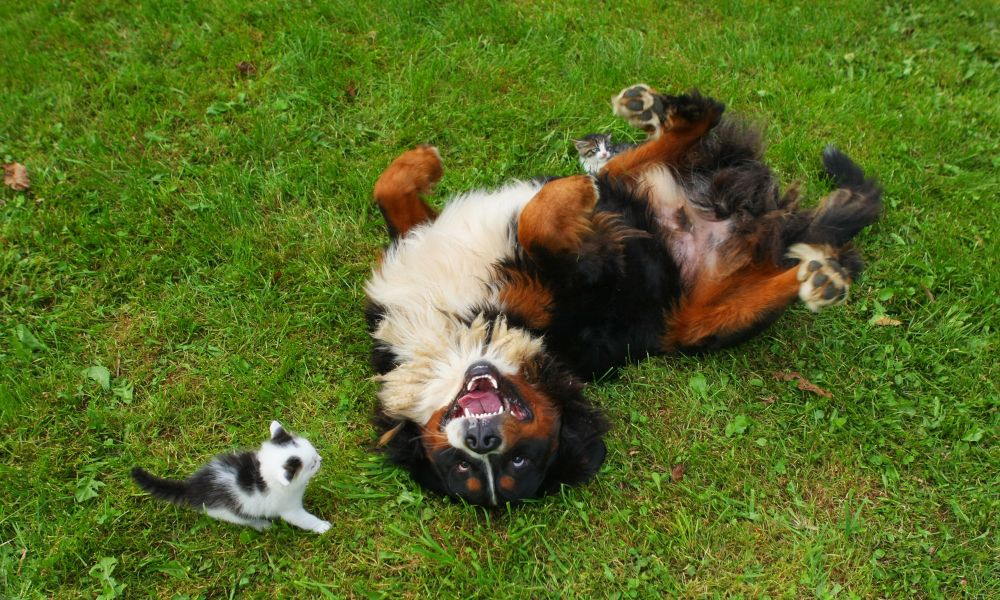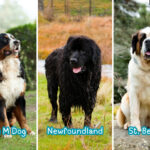 10 Nov
10 NovAre Bernese Mountain Dogs Good With Cats?
As a devoted dog parent with a special place in my heart for these gentle giants, I’m excited to share insights about this topic. It’s crucial for pet owners to understand how different animals interact, especially when considering adding a new furry member to their family. So are Bernese mountain dogs compatible with cats?
Yes, Bernese Mountain Dogs are generally good with cats. This compatibility largely stems from the breed’s calm and friendly nature. Bernese Mountain Dogs, known for their gentle temperament, can coexist peacefully with cats, especially when properly introduced and socialized from a young age.
Bernese Mountain Dogs, known for their friendly demeanor and striking appearance, often spark curiosity about their compatibility with other pets, particularly cats. In this post, we’ll uncover the truth about the relationship between these lovable dogs and their feline counterparts.
Whether you’re a long-time dog owner or contemplating your first pet, this article aims to provide clear, practical information to guide you in creating a harmonious multi-pet household.

Understanding Cat Compatibility with Dogs
When considering adding a dog to a household that already has a cat, or vice versa, it’s important to understand the factors that can influence their compatibility. While some dog breeds are naturally more inclined to get along with cats, individual personality and training play significant roles as well.
1. Breed Traits
Certain dog breeds are known for their higher prey drive, which can make cohabitation with cats challenging. Breeds with a lower prey drive, like Bernese Mountain Dogs, are often more tolerant and gentle with cats. It’s essential to research breed-specific traits to gauge potential compatibility.
2. Individual Personality
Just like humans, each dog has a unique personality. Some may be naturally more curious and friendly towards cats, while others might be indifferent or even hostile. Observing a dog’s behavior around cats before bringing them into a cat-inhabited home is crucial.
3. Training and Socialization
Early socialization and consistent training play pivotal roles in nurturing a dog’s ability to coexist with cats. Dogs that are exposed to cats in a positive, controlled environment from a young age are more likely to develop a friendly relationship with them. Training that emphasizes obedience and calm behavior is also beneficial in promoting peaceful interactions.
Introducing dogs to cats can present challenges. Cats are territorial animals and may perceive a new dog as an intruder, leading to stress or aggression. Similarly, dogs might see cats as prey or playthings, which can frighten or harm the cat.
To mitigate these issues, introductions should be gradual and supervised, ensuring both pets feel safe and secure. Understanding these dynamics and preparing for them can significantly increase the chances of a successful and harmonious relationship between your dog and cat.
Training and Socialization Tips
Introducing a Bernese Mountain Dog to a cat requires patience, understanding, and the right approach. Here are some effective training and socialization tips to foster a peaceful coexistence:
1. Start with Controlled Introductions
Begin by keeping the Bernese Mountain Dog and the cat in separate areas. Let them get accustomed to each other’s scent by swapping blankets or toys. Gradually introduce them in a controlled setting. Initially, keep the dog on a leash and ensure the cat has an escape route. Short, supervised meetings are key. Observe their body language and behaviors closely.
2. Maintain a Calm Environment:
Create a stress-free atmosphere during introductions. Avoid loud noises or sudden movements that might startle either pet. Use a calm and reassuring tone when interacting with both animals. This helps in transmitting a sense of safety and security.
3. Positive Reinforcement Training
Reward calm and non-aggressive behavior with treats and praise. This encourages the dog to associate positive experiences with the cat’s presence. Teach basic obedience commands like ‘sit,’ ‘stay,’ and ‘leave it’ to your Bernese Mountain Dog. This establishes control and can prevent potential chasing or rough play.
4. Gradual Increase in Interaction
As they become more comfortable with each other, allow longer and more direct interactions under supervision.
Monitor their interactions continuously and step in if there are signs of aggression or fear.
5. Respect Each Pet’s Space
Ensure that both the dog and the cat have their own safe spaces where they can retreat to. This is crucial for them to feel secure. Never force interactions. Allow them to approach each other in their own time.
6. Consistent Routine
Maintain a consistent routine for feeding, playtime, and rest. This predictability helps in reducing territorial or competitive behaviors.
7. Professional Guidance
If needed, don’t hesitate to seek advice from a professional trainer or behaviorist, especially if there are signs of aggression or extreme fear. Remember, each Bernese Mountain Dog and cat is unique, and their adjustment period can vary. Patience and consistency are key in helping them develop a friendly and respectful relationship.

Bernese Mountain Dogs and Cats As House Mates
Bernese Mountain Dogs are known for their gentle, friendly nature, which often makes them suitable companions for cats. Here’s a closer look at how their specific traits influence interactions with feline friends:
1. Temperament
Bernese Mountain Dogs are typically calm, patient, and affectionate, traits that bode well for cohabiting with cats.
They are not usually aggressive, which reduces the risk of confrontations with cats.
2. Size and Play Style
Despite their large size, Bernese Mountain Dogs are often gentle giants. However, their size can be intimidating to cats, especially initially. Their play style tends to be less rambunctious compared to some other breeds, which is beneficial when interacting with cats.
3. Socialization Needs
These dogs are social animals and generally enjoy the company of other pets, including cats.
Early socialization is key. Bernese Mountain Dogs that grow up with cats typically adapt better and are more likely to view them as part of their social group.
4. Prey Drive
While every dog has a natural prey drive, it is less pronounced in Bernese Mountain Dogs, making them less likely to chase cats. Individual variations do exist, so it’s important to evaluate each dog’s reaction to cats.
5. Training and Obedience
Bernese Mountain Dogs are known for their trainability. This can be advantageous in managing their interactions with cats and ensuring they respond to commands that promote peaceful coexistence.
6. Energy Levels
These dogs have moderate energy levels. They are not overly hyper, which is beneficial, as excessive energy can be overwhelming for cats.
7. Supervision and Interaction
Despite their typically friendly disposition, supervision during initial interactions is crucial to ensure the safety of both pets. Positive reinforcement and gradual introduction can help in building a harmonious relationship.
Potential Challenges and Solutions
Even with their friendly nature, Bernese Mountain Dogs may face certain challenges when sharing a home with cats. Here are some common issues and strategies to address them:
1. Size Difference and Intimidation
- Challenge: The large size of Bernese Mountain Dogs can be intimidating to cats, especially at first.
- Solution: Allow the cat to observe the dog from a safe distance initially. Use barriers like baby gates to provide a safe space for the cat.
2. Chasing Behavior
- Challenge: Despite a lower prey drive, some Bernese Mountain Dogs may exhibit chasing behavior, which can stress or endanger the cat.
- Solution: Train your dog with commands like ‘leave it’ or ‘stay’ to control this impulse. Distract the dog with toys or treats when it shows interest in chasing the cat.
3. Territorial Behavior from the Cat
- Challenge: Cats can be territorial and may not welcome the new addition.
- Solution: Gradually introduce them while respecting the cat’s space. Provide the cat with high perches and separate areas where it can retreat.
4. Overzealous Play
- Challenge: The dog may play too roughly with the cat, not understanding its own strength.
- Solution: Supervise playtime and intervene if play gets too rough. Teach your dog gentle play habits with the cat.
5. Resource Guarding
- Challenge: Both pets might display resource-guarding behavior, leading to potential conflicts.
- Solution: Ensure each pet has its own food bowls, beds, and toys. Feed them in separate areas to prevent competition.
6. Lack of Socialization
- Challenge: If the Bernese Mountain Dog is not used to cats, it might not know how to interact appropriately.
- Solution: Provide controlled, gradual socialization experiences. Consider enlisting the help of a professional trainer if needed.
7. Health and Safety Concerns
- Challenge: There’s a risk of accidental injury due to the dog’s size or playful behavior.
- Solution: Always supervise interactions until you are confident both animals can interact safely. Ensure the cat has escape routes and safe spaces.




